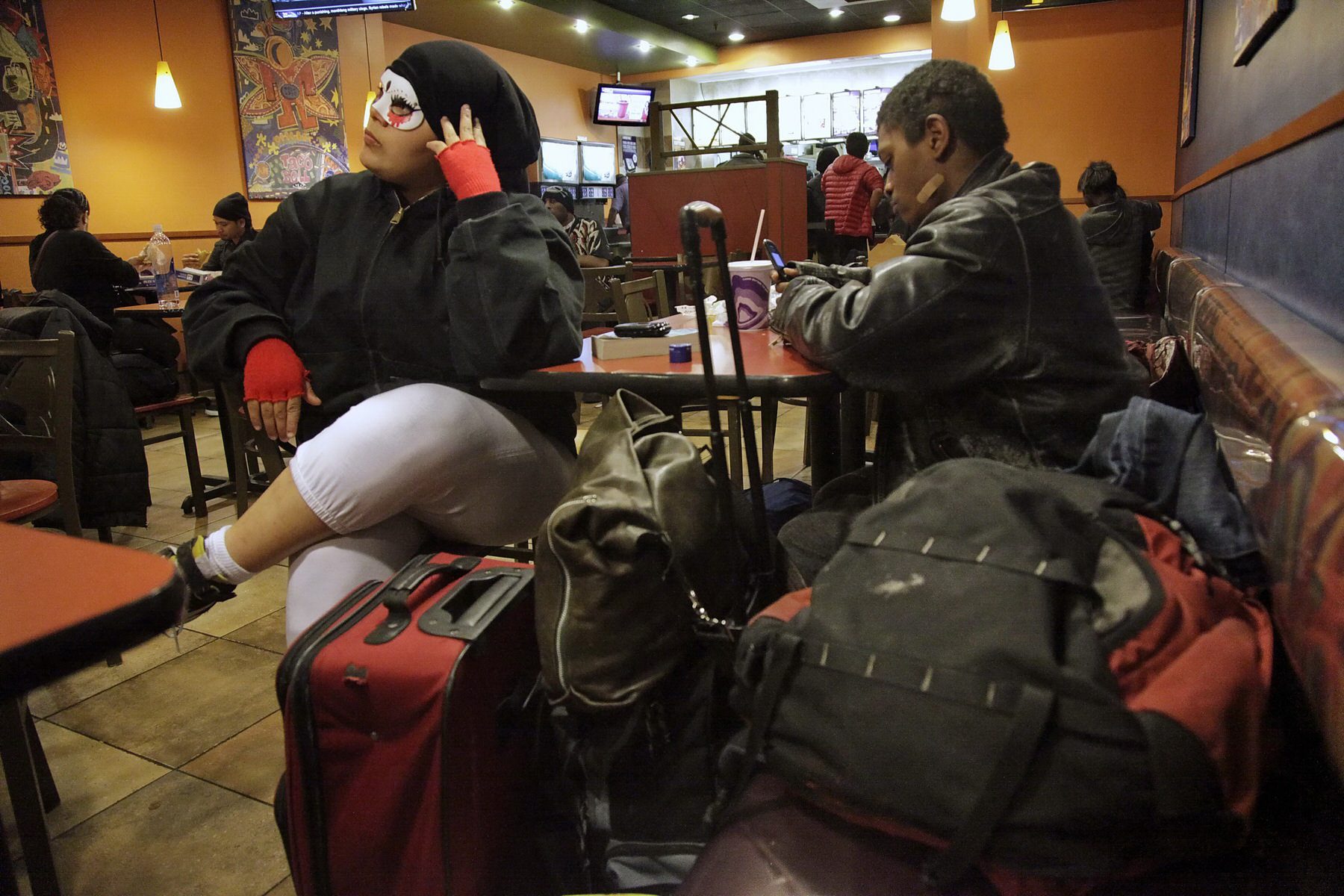J. Williams came home to an eviction notice last week. The single page, stuck to the door of the Las Vegas condo they have called home for seven years, stated that Williams and their wife have 30 days to vacate.
“I don’t sleep very well anymore,” Williams said. “We owe a ton of rent and might get kicked out of our house, and I have no way of fixing this situation because it is entirely out of my control.”
Williams, who is nonbinary transgender and whose name has been changed because they are not out at work, owes their landlord more than $10,000 in back rent. They had been working as a stagehand, a union job that paid $30 an hour, a situation many of their peers envied. And then March 2020 hit. The pandemic decimated the event industry. No more concerts. No more musicals. Their wife, who has a disability, also couldn’t work. The couple couldn’t make rent, and the bills started to add up.
“I picked up a canvassing job during election season, so there would just be like some money coming in,” Williams said. “I did some handyman stuff for other people under the table.”
The large-scale events that Williams worked on still haven’t returned. And even when they do, Williams fears discrimination: They came out as nonbinary trans during the pandemic to close family and friends, but they have yet to tell coworkers.
Williams is one of the 7.4 million Americans behind on rent, according to the latest U.S. Census Bureau data, a number that has doubled in the pandemic. A federal eviction moratorium, put in place to stop the spread of COVID-19, expired on July 31. After an effort led by Democratic Rep. Cori Bush, the Centers for Disease Control and Prevention announced Tuesday that it would put in place a new, partial moratorium for another 60 days through October 3 in areas with high COVID-19 transmission — covering about 90 percent of the population.
The moratorium never completely stopped evictions — Williams’s notice reached their door two days before it ended. In the six states and 31 cities tracked by Eviction Lab at Princeton University, a national eviction database, 451,772 evictions have been filed during the pandemic.
But even when honored, experts said, the moratorium is a stopgap measure that doesn’t completely address the degree of economic instability facing communities across America. That instability that may only grow as the Delta variant pushes cases of COVID-19 to historic highs in pockets of the country and jobs are again at risk. LGBTQ+ people, in particular, face a compounding risk, forged by discrimination that makes them more likely to lose their homes, more likely to live in poverty and less likely to find accommodations if they are evicted.
Prior to the pandemic, about 22 percent of all LGBTQ+ adults were living in poverty, compared to 16 percent of cisgender straight adults, according to a 2019 study by the Williams Institute on Sexual Orientation and Gender Identity Law and Public Policy. Rates were even higher for transgender adults, with about 29 percent living in poverty, and queer people of color — the rate was 30 percent for Black LGBTQ+ people.
Housing insecurity has long been rampant. Many LGBTQ+ people lack support from family and turn to homeless shelters, which often don’t allow transgender people to be housed in a way that’s consistent with their gender. That has put LGBTQ+ people between the ages of 18 and 25 at 2.2 times greater a risk of homelessness than non-LGBTQ+ people, according to a 2018 study by Voices of Youth Count, a research initiative at the University of Chicago that studies homelessness. According to the U.S. Transgender Survey, 30 percent of transgender people have experienced homelessness in their lifetimes.
Queer adults are also more likely to rent — only about half own their homes, compared to 70 percent of cisgender straight people, according to the Williams Institute.
The arrival of the pandemic only magnified these problems. Data from LGBTQ+ advocacy organization the Human Rights Campaign shows that 40 percent of LGBTQ+ people in the United States work in jobs where they might be exposed to the virus, like restaurant and service jobs, hospitals and schools — careers that have been among the hardest hit in the pandemic-induced recession.
“From economic hardships, such as being more likely to have experienced a cut in work hours, to the direct impact that the pandemic has had on mental health, to being more likely to work in essential jobs, LGBTQ people have borne the brunt of the pandemic,” said J. Maurice McCants-Pearsall, the director of HIV and Health Equity at the HRC.
HRC reported that LGBTQ+ people continued to lose jobs even as vaccinations allowed states to reopen in the spring and summer. Queer Americans were 30 percent more likely than the general population to lose their jobs as states reopened than the general population, the organization found. They were also 50 percent more likely to get hit with a pay cut during the reopening. Among queer people of color that number jumped to a staggering 150 percent.
Evictions, then, could be a next wave for LGBTQ+ people, experts said, that could hit the community hard — and long-term.
Bianca D.M. Wilson, the senior scholar of public policy at the Williams Institute who has done economic research on LGBTQ+ Americans, said that once folks live in poverty, they are much more likely to repeat that cycle later in their lives.
Evictions can be what start the cycle.
“We’re talking about longer generations of economic instability,” she said.
Accessing aid — and quickly — is the key variable now facing LGBTQ+ Americans. But that help can be hard to access.
“There’s this long-standing problem in economics that lots and lots of people who are eligible for a lot of different types of public assistance just don’t take it up. Well for queer people, anticipated discrimination from people who are otherwise supposed to help you might be one reason why that occurs,” said Christopher Carpenter, a professor of economics and the director of the Vanderbilt LGBTQ+ Policy Lab.
Tenants facing potential eviction can tap into the more than $45 billion in emergency rental aid available, but the distribution has been glacially slow, and eviction proceedings move quickly, sometimes in a matter of weeks. Some states haven’t disbursed any of the funds, while most have only spent a tiny percentage.
For many LGBTQ+ people, the first roadblock for assistance is the application. Many require that applicants list their gender for reporting purposes, but only include two options: male and female. Most, if any, don’t ask about gender identity or sexual orientation — a reflection of a national failure to collect data on those demographics that has made it difficult to calculate the extent of economic instability for queer communities.
“If they don’t have an inclusive demographic questionnaire, that could pose another barrier. Same if they asked for the sex or gender of an applicant, and they’re so restrictive that they ask for something like photo ID and if those don’t match — that’s an application barrier,” said Sarah Hassmer, senior counsel for the National Women’s Law Center’s income security team.
Applications for aid are increasingly tied together — if you apply for food stamps, you may be encouraged to also apply for rental assistance, for example — which can be beneficial if an applicant is able to successfully get through the system, but detrimental if the applications present challenges.
Trans youth are particularly vulnerable, and already face difficulty obtaining food stamps, rent and utility assistance, or supplemental security income while trying to update their name and gender documentation, said Elly Bludworth, director of youth housing at the Sexual Minority Youth Assistance League (SMYAL), which provides transitional housing for up to 38 LGBTQ+ young adults in Washington, D.C.
Bludworth also noted that many LGBTQ+ youth are unable to get housing services or government assistance due to discrimination or lack of knowledge on where to go. The youth who are soon leaving SMYAL’s temporary housing, and who have recently left, are vulnerable.
Some are blocked from shelters because they engage in sex work to survive, something frequently experienced among trans people. Others are blocked from shelter because of a history of substance abuse, which is disproportionately reported in the community overall. Other young LGBTQ+ people who are HIV positive or immunocompromised are worried about the health risks of congregate living. And for others still, there is the threat of abuse. Across multiple studies, LGBTQ+ people who seek shelter report mistreatment, harassment or assault. As many as 70 percent of transgender people have experienced some form of abuse at a shelter.
“The eviction moratorium was kind of a saving grace. Our youth who are already evicted at a higher rate … and vulnerable, it kind of gave a little bit of a buffer,” Bludworth had previously told The 19th, on the first moratorium. “That eviction moratorium also kept them healthy, and made it so that they couldn’t get evicted from their home, they weren’t going to have to go to a shelter.”
Many shelters and transitional housing programs available to LGBTQ+ people are full, Bludworth said. SMYAL has only a couple open spots and a waiting list to fill them. The program can house 26 LGBTQ+ young adults for anywhere from 18 months to two years, and it launched a long-term program in March to house 12 LGBTQ+ youth for up to six years.
“I’m really happy that the eviction moratorium got extended, that’s like a breath of fresh air and a sigh of relief for a lot of people,” Bludworth said, in response to the extension announced Tuesday.
Beyond seeking shelter space, some queer people can’t live with relatives if they’re evicted because their families aren’t accepting of their gender identity or sexual orientation. It’s something that played out during the pandemic when schools closed and students had to return home — some LGBTQ+ students didn’t have a place to turn to, Carpenter said.
“Families are actually a big source of ’insurance’ from housing instability, and we know that queer folks are just much more likely to have difficult relationships with their families,” Carpenter said. “Their minority sexual orientation and/or their minority gender identity is often a reason why they have had to seek alternative housing arrangements to begin with because they have been rejected from parents.”
At SMYAL, Bludworth said that she expects the organization to further discuss the eviction moratorium and what it means for homeless LGBTQ+ youth with city agencies and nonprofits.
“It’s just all these factors that are coming together, and could potentially be very scary for youth that are already marginalized,” Bludworth said. “They’ve been vulnerable for a long time, but especially during this time.”
With evictions likely to continue with a partial moratorium now in place, one major change implemented earlier this year will be put to the test — and it has the potential to help many LGBTQ+ people.
The Department of Housing and Urban Development announced in February that it would bar discrimination on the basis of sexual orientation and gender identity, responding to an executive order from President Joe Biden. The Fair Housing Act doesn’t currently include that provision, instead outlining a broader rule that makes sex discrimination illegal. But a Supreme Court ruling last summer extended workplace protections to LGBTQ+ people, and paved the way for all federal agencies to interpret the law as such.
So, for the first time, it is illegal for landlords to discriminate against LGBTQ+ people.
It’s not a permanent change, said Hassmer of the National Women’s Law Center — a future administration could reverse the guidance, and protections would disappear. Long-term solutions include passing the Equality Act, which would secure nondiscrimination protections for queer people at the federal level, she said.
“We can’t just base the status of LGBTQ+ rights on who’s the president,” Hassmer said.
HUD has begun disbursing $19.4 million in aid to fair housing agencies to help shore up resources to fight discriminatory housing practices that emerge because of the pandemic. The money would help regional offices respond to fair housing complaints, including discrimination due to gender identity and sexual orientation, the agency said in a statement.
Until recently, the Biden administration’s focus has been on encouraging localities and states to prepare for a potential wave of evictions and modeling potential solutions — solutions like what Judge Rachel Bell is doing in Nashville. Bell was part of the second White House Eviction Prevention summit held last month, where the administration heard from people in 46 cities.
At the event, she talked about the housing court she set up prior to the start of the pandemic that has become an “all-hands-on-deck” situation as evictions started to pour in despite the moratorium in place, she said.
Her housing court worked to proactively reach out to landlords and tenants involved in disputes, sometimes going to apartment complexes to encourage people to show up in court so the housing court could work out individualized plans for each case. That included working on finding renters new housing, signing up for rental assistance or, for those who need long-term help, directing them into the court’s six month program that helps people find stable jobs, homes and other aid such as mental health assistance.
“I don’t want to sign off on eviction,” Bell told The 19th. “What I want to sign off on is to dismiss the case if you have moved or you have found housing.”
Of the 1,800 cases that went through her court, Bell said they were able to help more than 1,300 avoid eviction or reach a settlement between the two parties.
Bell, who is the first out queer judge in Nashville, hasn’t dealt with LGBTQ+ housing cases yet, but she said she understands how barriers compound for LGBTQ+ people and how her court can help address that.
“We are meeting people where they are, so no matter how they identify, we are meeting people where they are as a human and then once we understand what their individualized plan is — the layers of what is needed — then yes, we’re making those exemptions,” Bell said.
Recognizing that queer people may want to attend a court that understands their needs, Bell said she is working to set up an LGBTQ+ court in the next month. The court is for anyone who is dealing with the criminal justice system in any way, but wants their case diverted to a court that is staffed by experts who will be better versed in the particular challenges facing queer people.
“If you identify [as LGBTQ+], if you’re an ally, if you feel more comfortable with this particular group of people, then we can work with an individualized plan for you because you identify you need something that pertains more to your life,” she said.
It’s a perspective she hopes more courts take — to not just wait until cases come to them and handle them through a system that marginalized people may feel isn’t built for them. Instead, she wants to see courts build a system that will encourage people to take part.
She’s on the phone with someone every day, she said, talking about the model she created.
“It’s very important that you look to see what you can do to help somebody,” Bell said she told the White House. “What can you do to move the needle for marginalized people and create initiatives and implement them — not just talk about it.”





